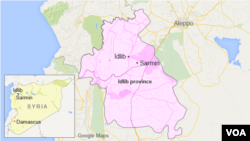Syrian government forces and rebel fighters have agreed to a cease-fire in the western region of the country, set to go into effect Friday under U.N. auspices.
The agreement involves a prisoner exchange and an exchange of populations, which some say may be part of a plan to create a new sectarian map for the country.
Syrian opposition activists and a rebel leader say a truce deal has gone into effect in two key battlegrounds where, until recently, government forces and their allies from Lebanon's Hezbollah waged a bitter battle against rebel fighters.
Militant Saudi cleric Abdullah Muhaysini told Arab media that Shi'ite women and children from the besieged government-held enclaves of Fou'a and Kefraya would be allowed to leave in exchange for the evacuation of rebel-fighters in the town of Zabadani, north of Damascus.
Previous cease-fire attempts fizzled out quickly. Arab media report the new cease-fire is likely to hold due to support from key power-brokers Iran and Turkey. They also note the agreement has the seal of approval of the U.N., as well as several rebel factions and the Syrian government.
Ali Ibrahim, an opposition figure in the rebel-held Damascus suburbs, told Arab media that a delegation from Iran and Hezbollah was responsible for negotiating details of the cease-fire with the rebel Jeish al Fatah and Ahrar al Sham factions inside Turkey.
Rami Abdel Rahman of the London-based opposition Syrian Observatory for Human Rights told VOA the cease-fire already has gone into effect.
Syrian Interior Minister Mohammed Sha'ar told state TV the government is still aiming for total victory over rebel fighters.
He said the celebration now underway for the Adha holiday will be even greater when the government succeeds in expelling rebel “gangs” from every inch of Syrian territory.
Despite government insistence it will fight to “liberate” all of the country, some analysts, like Joshua Landis, who heads the Center for Middle East Studies at the University of Oklahoma, argue the situation appears "to be heading for a de facto partition” of the country, although he believes both the US and Russia will "studiously avoid mention of such an ill-fated word, which would be illegal according to international law and reviled by 70% of Syrians."
Dubai-based Middle East analyst Theodore Karasik argues that the cease-fire may be interpreted by some as the "implementation of a forced resettlement," but that it could also be viewed as a "temporary reprieve" before the Russians start to act in the region of Idlib, which he argues is "critical for the Alawites."
Some Arab media have speculated Russian President Vladimir Putin would discuss a plan for a de facto partition of Syria with U.S. President Barack Obama when the two meet next week on the sidelines of the U.N. General Assembly opening session.














